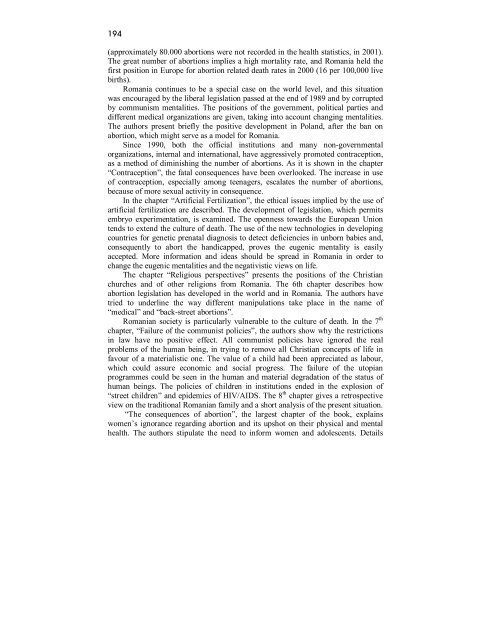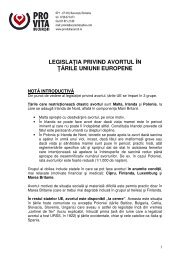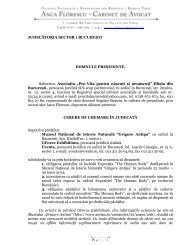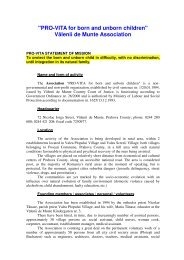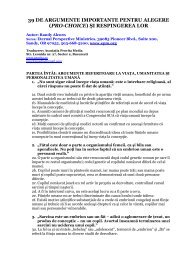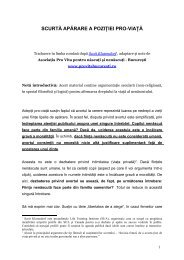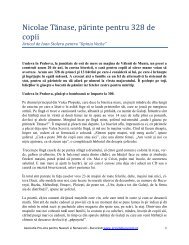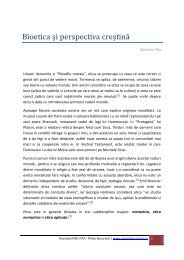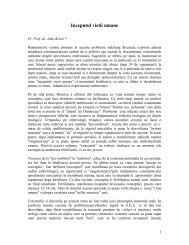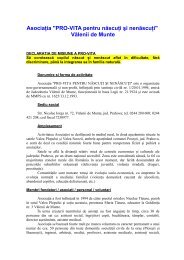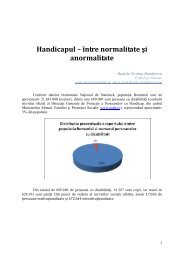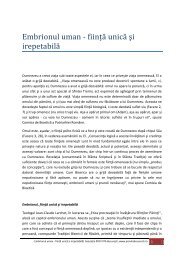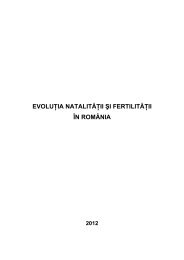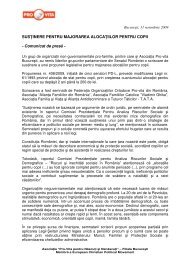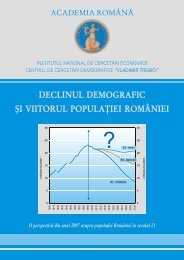O viziune asupra vietii - Asociația Pro-vita
O viziune asupra vietii - Asociația Pro-vita
O viziune asupra vietii - Asociația Pro-vita
Create successful ePaper yourself
Turn your PDF publications into a flip-book with our unique Google optimized e-Paper software.
194<br />
(approximately 80.000 abortions were not recorded in the health statistics, in 2001).<br />
The great number of abortions implies a high mortality rate, and Romania held the<br />
first position in Europe for abortion related death rates in 2000 (16 per 100,000 live<br />
births).<br />
Romania continues to be a special case on the world level, and this situation<br />
was encouraged by the liberal legislation passed at the end of 1989 and by corrupted<br />
by communism mentalities. The positions of the government, political parties and<br />
different medical organizations are given, taking into account changing mentalities.<br />
The authors present briefly the positive development in Poland, after the ban on<br />
abortion, which might serve as a model for Romania.<br />
Since 1990, both the official institutions and many non-governmental<br />
organizations, internal and international, have aggressively promoted contraception,<br />
as a method of diminishing the number of abortions. As it is shown in the chapter<br />
“Contraception”, the fatal consequences have been overlooked. The increase in use<br />
of contraception, especially among teenagers, escalates the number of abortions,<br />
because of more sexual activity in consequence.<br />
In the chapter “Artificial Fertilization”, the ethical issues implied by the use of<br />
artificial fertilization are described. The development of legislation, which permits<br />
embryo experimentation, is examined. The openness towards the European Union<br />
tends to extend the culture of death. The use of the new technologies in developing<br />
countries for genetic prenatal diagnosis to detect deficiencies in unborn babies and,<br />
consequently to abort the handicapped, proves the eugenic mentality is easily<br />
accepted. More information and ideas should be spread in Romania in order to<br />
change the eugenic mentalities and the negativistic views on life.<br />
The chapter “Religious perspectives” presents the positions of the Christian<br />
churches and of other religions from Romania. The 6th chapter describes how<br />
abortion legislation has developed in the world and in Romania. The authors have<br />
tried to underline the way different manipulations take place in the name of<br />
“medical” and “back-street abortions”.<br />
Romanian society is particularly vulnerable to the culture of death. In the 7 th<br />
chapter, “Failure of the communist policies”, the authors show why the restrictions<br />
in law have no positive effect. All communist policies have ignored the real<br />
problems of the human being, in trying to remove all Christian concepts of life in<br />
favour of a materialistic one. The value of a child had been appreciated as labour,<br />
which could assure economic and social progress. The failure of the utopian<br />
programmes could be seen in the human and material degradation of the status of<br />
human beings. The policies of children in institutions ended in the explosion of<br />
“street children” and epidemics of HIV/AIDS. The 8 th chapter gives a retrospective<br />
view on the traditional Romanian family and a short analysis of the present situation.<br />
“The consequences of abortion”, the largest chapter of the book, explains<br />
women’s ignorance regarding abortion and its upshot on their physical and mental<br />
health. The authors stipulate the need to inform women and adolescents. Details


